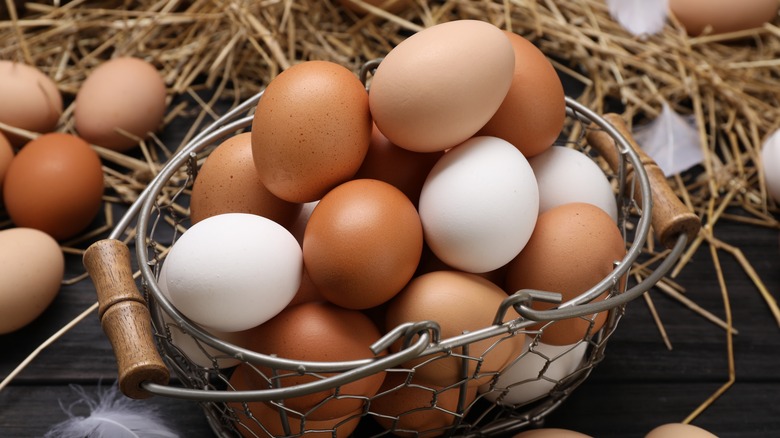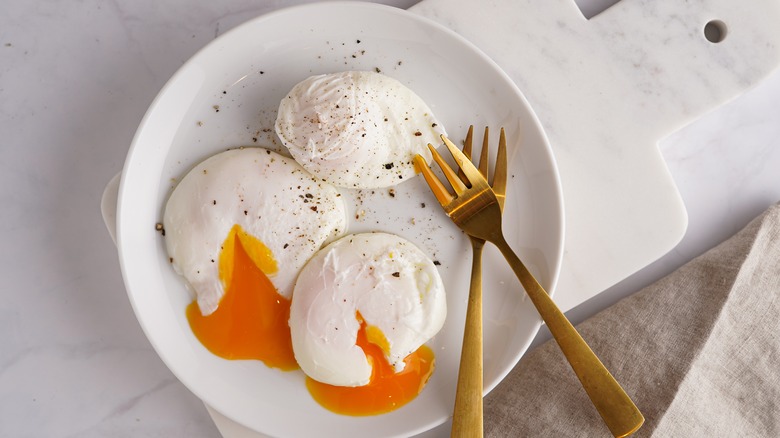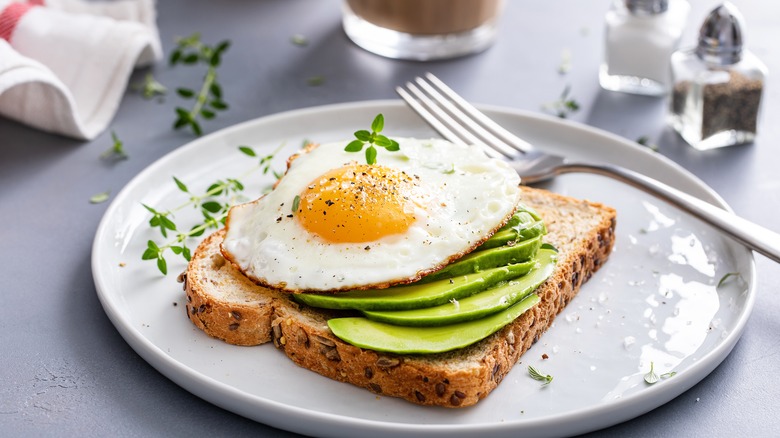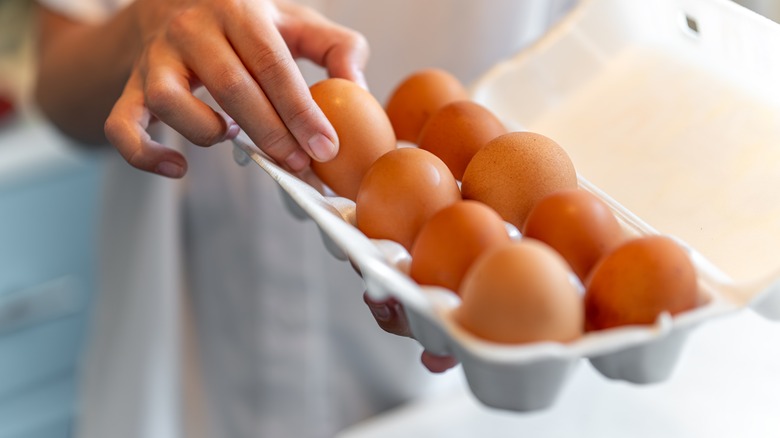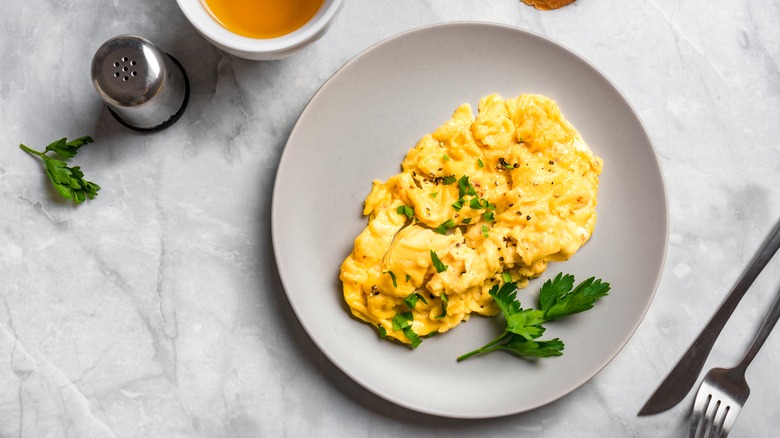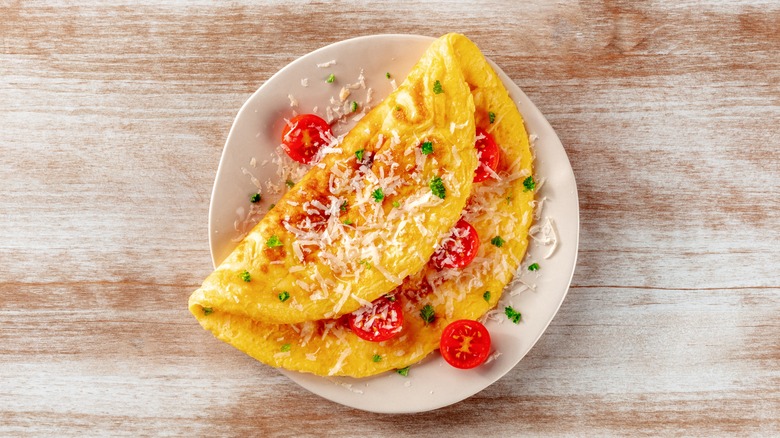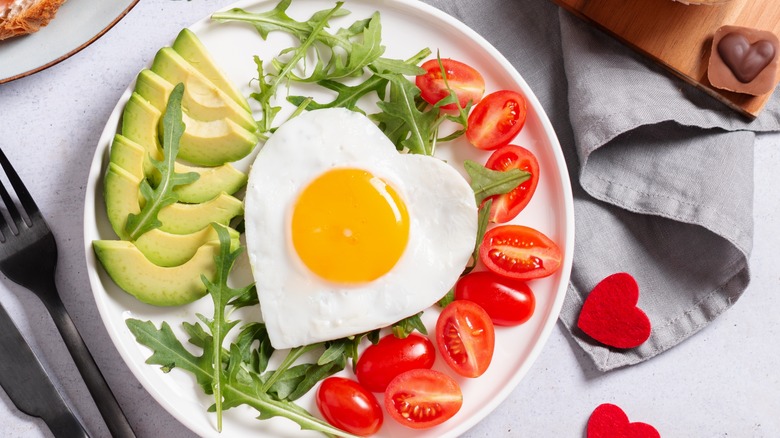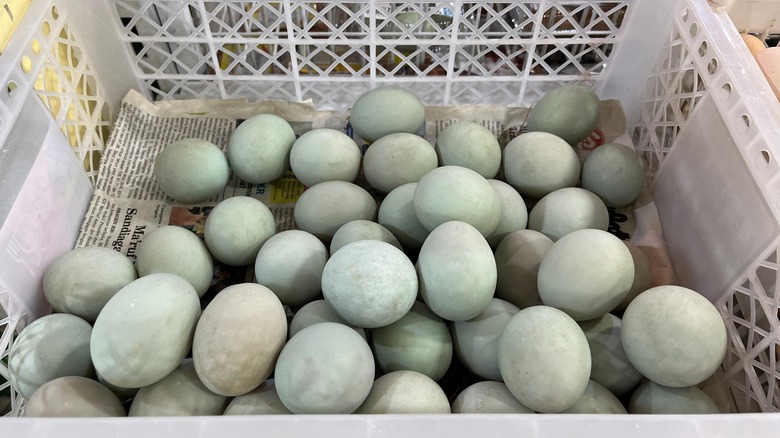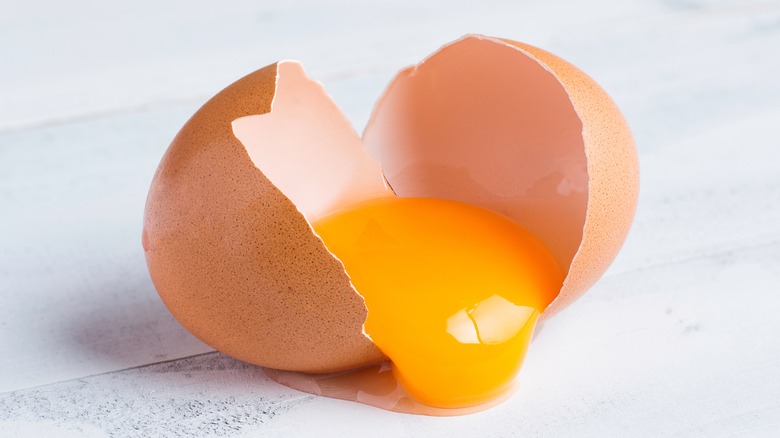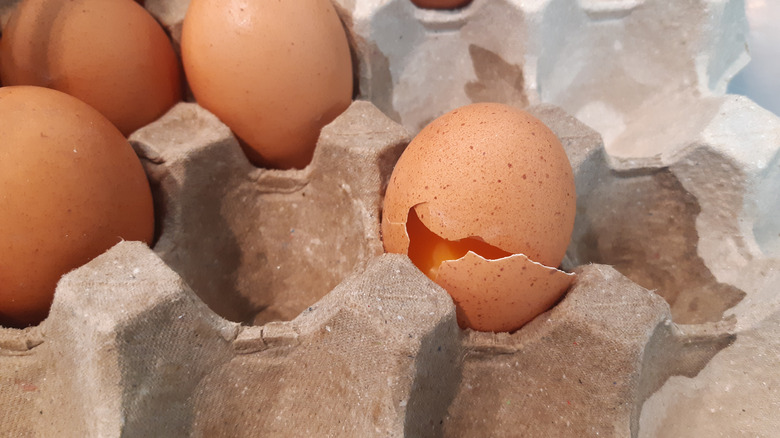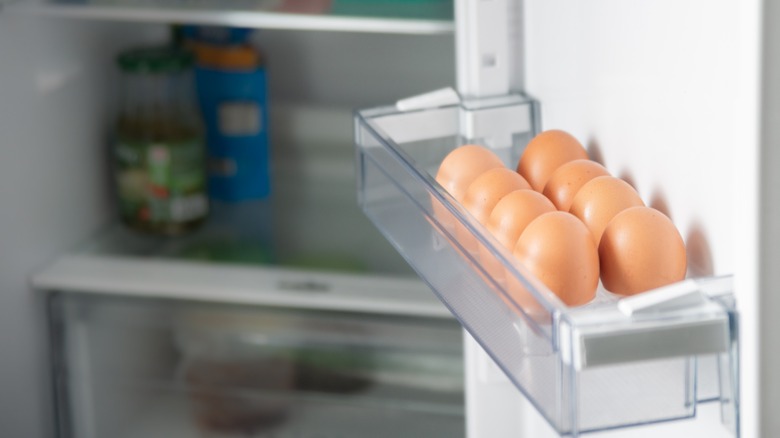Experts Debunk 10 Common Egg Myths
Eggs are a popular and versatile ingredient that can star in dozens of dishes for breakfast, lunch, and dinner, as well as being a crucial component in baked goods and desserts. Despite their popularity, eggs are subject to a number of false claims that can leave home cooks unsure how to handle them.
To help sort out the facts from the fiction, we spoke to two experts to get their take on the truth behind the myths: Cindy Chou, RDN, chef, and registered dietitian nutritionist at The Sound of Cooking, and Mareya Ibrahim, trained chef, holistic nutritionist, brain health coach, author, and award-winning inventor. Both have years of experience cooking with eggs, as well as a sound understanding of the nutrition involved.
If you've been wondering whether you can eat eggs every day or if you need to throw them out once they reach their use-by date, you've come to the right place. With expert help, we will put your mind at ease by straightening out the myths surrounding this wonderful ingredient.
Poached eggs are too difficult to prepare at home
Poached eggs are the beautifully presented star of many breakfast and brunch dishes, but if you've ever attempted to recreate eggs Benedict at home, you may have discovered it's not as easy as it seems. Many home cooks are put off by the prospect of so many factors that could go wrong: overcooked, undercooked, split yolk — the list is daunting. But with a little expert help, you can definitely make poached eggs at home.
"With a few tips, poached eggs can be easy to make at home," says Cindy Chou. "It helps to use fresh eggs ... as the whites will hold their shape better. Next, use a mesh strainer to remove the thin, outermost layer of whites before gently sliding the eggs into a pot of hot water that's close to boiling (right before it starts to bubble). By removing the thin whites, which are different than the denser thick egg whites, you get nicely shaped poached eggs."
Mareya Ibrahim also believes that poaching eggs can be mastered at home and has a handy tip for creating beautifully set whites. "With a long-handled spoon, gently swirl the water, creating a 'whirlpool' to help keep the egg whites together," she says. "Set a timer for 5 minutes for soft-poached perfection. Remove the eggs from the water with a slotted spoon and place them on a plate lined with paper towels to absorb excess water."
You don't have time to prepare a healthy egg-based breakfast
Eggs are a fantastic way to start the day with their high-quality protein and healthy fats. But for many of us, the thought of cooking eggs before work is just too much, and we end up reaching for sugary cereals instead.
"Incorporating eggs into the morning routine doesn't have to be time-consuming, and there are plenty of easy ways to enjoy their delicious nutrition without sacrificing precious minutes," says Mareya Ibrahim. "One of the simplest strategies is to boil a batch of eggs the night before ... and cool them in an ice water bath. In the morning, grab a hard-boiled egg on your way out the door for a portable, protein-packed breakfast."
Cindy Chou has a unique way of enjoying eggs in the morning: "I like to have soy sauce marinated boiled eggs ready for busy days and will add them to reheated oatmeal or rice with a side of pickled or fermented vegetables like kimchi," she explains.
Both chefs also recommend egg muffins that can be made in advance and reheated when you need them, and they couldn't be simpler to prepare. Choose whatever veggies you fancy, mix them up with the eggs and some cheese, then bake for around 20 minutes. You could make these multiple times a week and never tire of them since the ingredients are so easy to change each time. For Sunday brunch, upgrade them to these delicious prosciutto egg cups instead.
You should throw out eggs once they reach their use-by date
In a bid to keep our families safe, we often discard perfectly good food prematurely, considering the use-by date on the pack to be a definite guide as to their usability. With eggs, the date on the carton is more of a guide to the freshness of the eggs, but in most cases, they are safe to eat for many days afterward.
"As long as the eggs don't have cracks in their shells and are properly refrigerated at 40 degrees Fahrenheit or slightly below, they should be safe to use for up to 3-5 weeks from the day they were packed," explains Cindy Chou. "This date, also known as the Julian date, is printed on the side of the carton as a three-digit number representing the day of the year (001 as January 1st and 365 as December 31st)."
Mareya Ibrahim also suggests that there is no need to be overly cautious with the expiration date on eggs if they have been stored at the right temperature. "Even though a carton of eggs comes with an expiration date, you can typically enjoy them for a bit longer — around 2-3 weeks — if you've stored them properly at 40 degrees Fahrenheit or lower," she says. "So don't toss them out right away." By using your eggs slightly beyond their peak freshness, you can reduce food waste and save money without putting anyone's health in danger.
You need to add milk or cream to get fluffy scrambled eggs
In the quest for a top-notch breakfast, making restaurant-quality scrambled eggs can be challenging. The general consensus is that the key is to add dairy in the form of milk or cream, but Mareya Ibrahim and Cindy Chou are happy to quash that rumor.
"You don't need those dairy additions to get that light, airy texture; even water does the trick!" says Ibrahim. "The key is all in the whisking. Beat your eggs vigorously before cooking them until the mixture turns a pale yellow and forms tiny bubbles on the surface. This aeration is what gives you those delightfully fluffy scrambled eggs!"
So put away the cream and get your whisking arm ready instead. Chou also believes that fluffy scrambled eggs are achievable without dairy, and has a tip to take them to an even higher level of fluffiness: "I actually personally prefer to make scrambled eggs without adding milk or cream, and they always come out fluffy. Avoid over-whisking the eggs by mixing just until they are even in color and avoid overcooking," she suggests. "I like to mix in a cornstarch slurry, a common method in Cantonese-style scrambled eggs, for an even fluffier and softer texture."
This is great news if you are dairy intolerant or want to keep your eggs as simple as possible. With a bit of extra whisking, you can create beautifully fluffy scrambled eggs without any dairy in sight.
You should make omelets with only the whites of the egg
In the last decade or so, egg white omelets have become a bit of a health fad, particularly among those focused on keeping their fat intake low. However, the vast majority of the nutrition in an egg is found in the yolk — as well as most of the flavor — so making an omelet with the white alone is not doing your health, or your taste buds, any favors.
When we asked Mareya Ibrahim if home cooks should include yolks in their omelets, she replied: "Definitely, unless you are really hyper-focused on fat. The yolk is packed with nutrients — like calcium, iron, zinc, copper, manganese, vitamin B6, folate, and vitamin B12 — that you just can't get from the whites alone." She continued, "The yolk is where all of the fat in the egg is, but that's only about 5 grams per yolk. Plus, using the whole egg means no waste and more flavor, and with egg prices these days, it's smart to get the most out of what you've got. Stretch those eggs to the fullest!"
Cindy Chou added that you can make an omelet using only the egg whites if you wish, but the taste will undoubtedly suffer. "That's up to personal taste preferences," she noted, "but omelets made with the whole egg definitely have more flavor." Unless you have a very specific reason for avoiding fat, do yourself a favor and add whole eggs to your omelet recipe.
Eggs have a negative effect on cholesterol levels
Over the years, eggs have been unfairly villainized as a culprit in the raising of cholesterol levels. The confusion stems from a misunderstanding of the distinction between the cholesterol contained in food and blood cholesterol level. Modern science has now shown that the two are not the same, and that food containing cholesterol, such as eggs, do not need to be avoided for good heart health.
Registered dietitian Cindy Chou doesn't think that eggs need to be limited if you are looking out for your heart health. "Studies have shown that the cholesterol from foods, including eggs and their yolk, does not affect blood cholesterol levels for most healthy people," she explained. "Most of the cholesterol in our body is made by our liver. For a small percentage of individuals where dietary cholesterol may make a difference, there's an increase in both the HDL 'good' and LDL 'bad' blood cholesterol levels," she continued. "According to the American Heart Association, eggs are recommended for healthy adults as part of a heart-healthy diet."
So, unless you have been specifically advised by your doctor to avoid eggs, you can happily add one to your daily breakfast routine to get all the benefits from the protein, vitamins, and good fats that are found in eggs. If you want them to be as healthy as possible, cook them in water, such as poaching or boiling, rather than other methods that incorporate fat.
Hen's eggs are the only ones you should add to your diet
When we talk about cooking with eggs, the vast majority of people are talking about hen's eggs, and wouldn't even consider using any other kind. But if you are an adventurous cook, or just want to try something new, you should definitely consider eggs from other types of birds. The easiest to get a hold of would be duck eggs, and there are nutritional benefits to branching out beyond your usual eggs.
"Duck eggs pack an even bigger nutritional punch than chicken eggs, making them a great choice if you want to up your nutrient game," explains Mareya Ibrahim. "They typically have more protein and healthy fats — they just tend to be harder to find."
Cindy Chou breaks it down further, explaining that the size of the egg is a big factor, and hen's eggs have more of certain nutrients but less of others. "The nutritional content of each egg is largely different since they also differ in size, with hen eggs being the smallest," she says. "One goose egg is almost three times larger than a hen egg, and a duck egg is almost 1½ times larger."
"If you compare the nutritional profile for 100 grams (3.5 ounces) of cooked eggs," Chou continued, "they have similar amounts of protein, but hen eggs contain higher amounts of choline, while duck and goose eggs contain more vitamin B12, iron, and 1.7 grams more saturated fat."
Raw eggs are completely safe for anyone to eat
While you may find the idea of eating raw eggs strange, there are many foods that are regularly consumed that contain uncooked eggs. Homemade mayonnaise or hollandaise sauce, as well as certain desserts, use raw or lightly cooked eggs in the preparation. While this is likely to be fine in most cases, there is a theoretical risk from eating raw eggs.
"While eating raw eggs can be tempting, there are some risks involved mainly because of the potential for salmonella," says Mareya Ibrahim. "Sure, only about one in 20,000 eggs might have that little troublemaker, but it's still wise to keep the risk in mind."
If you are cooking any of the above dishes at home and still want to use raw eggs, there is a way to reduce the risk further. "If you're all about those raw or lightly cooked eggs, try using pasteurized eggs instead," Ibrahim suggests. "They're treated to eliminate any harmful bacteria while maintaining that awesome egg flavor. That way, you can whip up your favorite recipes with complete peace of mind!"
In some countries, such as the U.K., chickens are vaccinated against salmonella, meaning the risk of contamination is slim. Even pregnant women are allowed to eat raw eggs, provided they have the stamp that proves they have followed the British Lion Code of Practice. In the States, however, it is best to minimize the risk and cook your eggs thoroughly if you are concerned.
If an egg smells okay, it means it is definitely safe to eat
When you open the refrigerator with the intention of whipping up your favorite egg dish and realize your eggs are not as fresh as you thought, it can be hard to work out whether they are safe or not. Many of us assume that if an egg smells okay once it has been cracked, there is no possibility that it could be dangerous.
"Not necessarily," says Cindy Chou, "since an egg can be contaminated with the salmonella enteritidis bacteria that can cause food-borne illness. This bacteria is odorless and tasteless, so it's important to properly store and cook it." Keeping your eggs refrigerated will reduce the chances of dangerous bacteria spreading, but if they are damaged when you go to cook with them, it is not worth the risk.
"If you see a raw egg with cracks in the shell and are unsure when it happened, discard it as bacteria may have entered through the cracks," says Chou. Food safety is paramount, so if you are in doubt as to whether your eggs have been stored properly, don't take any chances. If your eggs have been in the refrigerator, their shells are intact, and they look and smell fine, the chances are they will be safe to eat.
Eggs always need to be refrigerated
If you have never thought too much about how to store eggs, it may seem pretty self-explanatory — after all, most refrigerators have a built-in egg holder in the door. However, eggs don't always need to be kept in the fridge, depending on how they've been processed before they reach grocery store shelves.
In the USA, commercially sold eggs are washed to reduce the spread of bacteria, which also removes a protective layer from the shell. This means the egg is more exposed to the possibility of contamination than it would have been, and keeping them refrigerated will reduce the chance of food-borne illness significantly. In countries where the eggs are not commercially washed — or perhaps when buying unwashed eggs from your local farmstand — the protective layer remains intact, meaning that eggs are sold at room temperature and can be kept that way for many weeks.
The quality of the eggs, in either case, will degrade more quickly at a warmer temperature, as Mareya Ibrahim points out: "A fresh egg stored at room temperature will start losing its quality after just a few days, so it's best to use them within 1-3 weeks," she advises. "But if you keep those eggs in the fridge, they can stay fresh and at their best for at least twice as long! Keeping them cool is a simple way to extend their shelf life and ensure you're always cooking with eggs that taste great."

